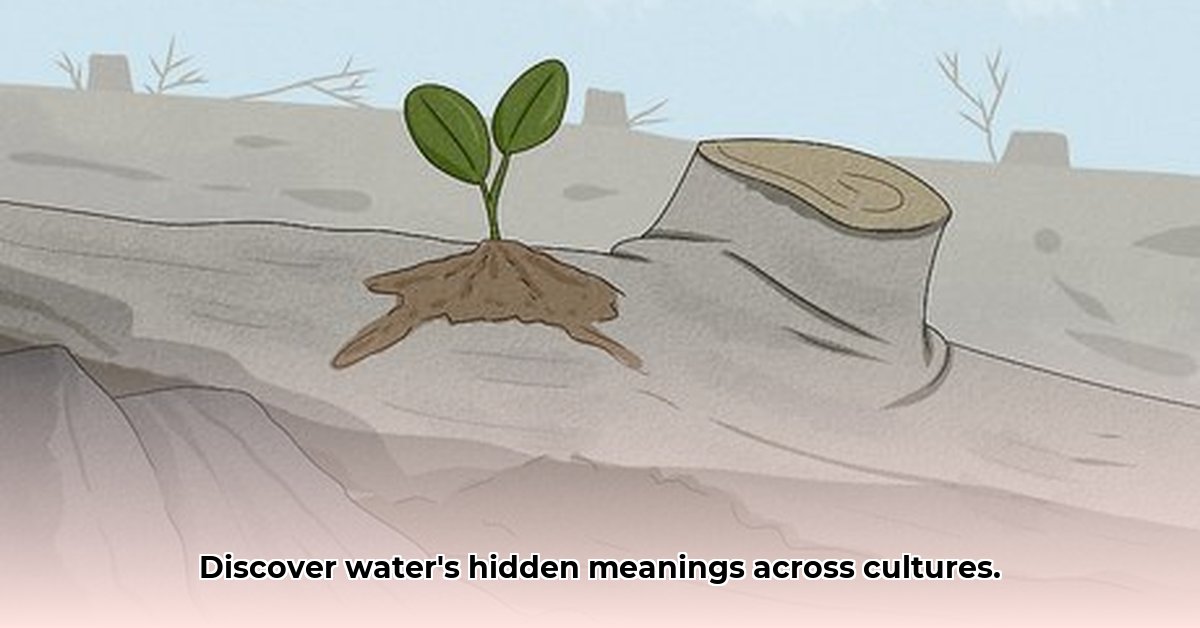
Water. The very word evokes a sensory symphony: the whisper of rain on parched earth, the powerful roar of a waterfall, the serene expanse of a still lake. But beyond its physical properties, water holds a profound and multifaceted symbolic weight across cultures, shaping myths, rituals, and our understanding of the world and ourselves. This exploration delves into the diverse interpretations of water's symbolism, revealing how this vital element has shaped human experience across time and geography. For a deeper dive into water symbolism, check out this great resource: Water Symbolism.
Water: The Source of Life and Rebirth
The life-giving properties of water form the bedrock of its symbolic power. For the ancient Egyptians, the annual flooding of the Nile wasn't merely a natural phenomenon; it was a sacred event, a divine renewal sustaining their civilization. Their intricate mythology reflects this deep connection, portraying water as the source of life and the continuous cycle of creation and regeneration. Numerous indigenous cultures worldwide echo this sentiment, viewing water as the primordial element from which all life originated. “[Water] is not just a substance; it's the lifeblood of the world,” Dr. Anya Petrova, Anthropologist at the University of California, Berkeley, observes. This primal association with fertility and rebirth is reflected in rituals worldwide, from Christian baptism—a symbolic cleansing and rebirth—to countless indigenous ceremonies.
But how profoundly does this life-giving image resonate with our modern sensibilities? Even today, a refreshing swim or a simple shower feels more than just physically cleansing; it's a symbolic renewal, tapping into a deeply embedded cultural understanding of water's restorative power. This intuitive connection highlights the enduring and pervasive nature of water's symbolic weight.
Purification and Cleansing: Washing Away the Old
Water's ability to cleanse physically extends to the symbolic realm. In numerous cultures, water plays a pivotal role in ritual purification, a symbolic washing away of not only physical grime but also spiritual impurities. Hindu traditions place immense importance on ritual washing (ablutions), an integral aspect of daily life and religious practice. Similarly, various indigenous communities utilize water in ceremonies to purify individuals and sacred spaces.
Professor David Chen, Professor of Religious Studies, Harvard University, explains: "These rituals aren't simply hygienic; they are symbolic acts of spiritual renewal, washing away negativity and preparing individuals for interaction with the divine." This cleansing symbolism transcends religious boundaries. We instinctively reach for water after physical exertion or a messy task—a symbolic act of purging both the physical and the metaphorical.
The Unseen Depths: Water and the Unconscious
Water's symbolism extends beyond the tangible. The mysterious depths of the ocean, an unexplored realm teeming with unseen life, serve as a potent metaphor for the human psyche's enigmatic aspects. The ocean's dark, unknown depths mirror the unconscious mind, the hidden recesses of our thoughts and emotions. This connection, deeply explored in Jungian psychology, uses water imagery to represent the subconscious, the unexplored regions of our inner selves.
Dreams, often described as flowing like a river, become a powerful tool for exploring this inner landscape. The journey of self-discovery is frequently envisioned as a descent into these depths, a symbolic plunge into the unconscious, analogous to diving into the ocean's depths. This powerful imagery highlights water as a symbol of exploration, representing both the thrill and trepidation associated with confronting our inner selves.
The Two Sides of Water: Life-Giver and Destroyer
Water's symbolism isn't solely positive. While life-giving and purifying, water also embodies chaos and destruction. Devastating floods, tsunamis, and powerful storms starkly remind us of nature's awesome destructive potential. This duality—the inherent contradiction—is a central element of water's symbolism across many cultures. This profound duality reflects the acceptance of both creation and destruction as integral parts of the life cycle, the forces of life and death inextricably intertwined.
This powerful symbolism serves as a potent metaphor for the unpredictability of life itself, reflecting both the joy of creation and the profound impact of destruction. It's a complex notion that challenges our need to simplify the world into simplistic, binary categories.
Water as a Metaphor for Life's Journey
Many spiritual traditions use the flowing river as a metaphor for the human spiritual journey. The river's unpredictable currents, twists, and turns mirror life's unexpected turns and the inevitable flow of time. The act of crossing a body of water, a common motif in mythology and folklore, often symbolizes a pivotal moment of transformation, a spiritual rebirth or passage. This aspect of water's symbolism provides a compelling image of personal growth and the challenges inherent in navigating life's course.
Key Takeaways:
- Water's symbolism transcends cultural boundaries, consistently representing life, purity, and transformation.
- However, it also embodies chaos, destruction, and the mysteries of the unconscious mind.
- The specific interpretation of water's symbolism varies based on physical form (ocean, river, rain) and cultural context.
- Psychological interpretations add another significant layer to water's meaning and relevance.
- Understanding water's rich symbolism offers invaluable insights into diverse cultures, psychological processes, and our complex relationship with the natural world.